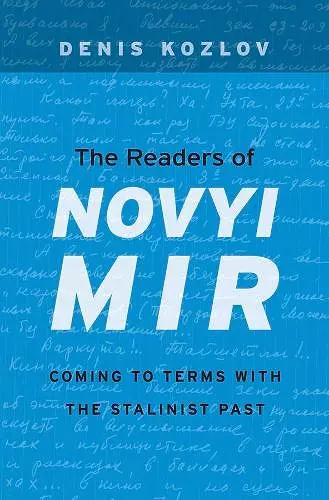The Readers of Novyi Mir
Coming to Terms with the Stalinist Past
Format:Hardback
Publisher:Harvard University Press
Published:1st Jul '13
Currently unavailable, and unfortunately no date known when it will be back

In the wake of Stalin’s death in 1953, the Soviet Union entered a period of relative openness known as the Thaw. Soviet citizens took advantage of the new opportunities to meditate on the nation’s turbulent history, from the Bolshevik Revolution, to the Terror, to World War II. Perhaps the most influential of these conversations took place in and around Novyi mir (New World), the most respected literary journal in the country. In The Readers of Novyi Mir, Denis Kozlov shows how the dialogue between literature and readers during the Thaw transformed the intellectual life and political landscape of the Soviet Union.
Powerful texts by writers like Solzhenitsyn, Pasternak, and Ehrenburg led thousands of Novyi mir’s readers to reassess their lives, entrenched beliefs, and dearly held values, and to confront the USSR’s history of political violence and social upheaval. And the readers spoke back. Victims and perpetrators alike wrote letters to the journal, reexamining their own actions and bearing witness to the tragedies of the previous decades.
Kozlov’s insightful treatment of these confessions, found in Russian archives, and his careful reading of the major writings of the period force today’s readers to rethink common assumptions about how the Soviet people interpreted their country’s violent past. The letters reveal widespread awareness of the Terror and that literary discussion of its legacy was central to public life during the late Soviet decades. By tracing the intellectual journey of Novyi mir’s readers, Kozlov illuminates how minds change, even in a closed society.
Writing to the papers was a surprisingly common activity in the USSR. It brought results: in the 1930s, a reader’s letter was either printed or sent, as unprintable, to the NKVD so that the author could be dealt with. After Stalin’s death, at least for readers of Novyi mir, there was no danger of the author being suppressed together with his or her letter. Given the paucity of outlets to express feelings and views, the 12,000 letters to Novyi mir that Kozlov has studied give unprecedented insight into the often confused and contradictory reactions aroused by the revelations, however guarded, of the horrors and lies of the past… Kozlov’s book becomes not just an excellent study of a Soviet journal, its readers and letter-writers and the editorial responses they received, but also of a very complex and eventually admirable man [poet Aleksandr Tvardovsky, chief editor of Novyi mir for much of the 1950s and all of the 1960s] torn between his inner knowledge and his sense of duty. -- Donald Rayfield * Literary Review *
With the opening of the archives of the journal and of its bureaucratic keepers, Kozlov gained access to tens of thousands of unpublished letters from readers as well as the records of editorial meetings and accounts of the authorities scrambling to respond to the latest controversies. This fine history reveals the society-changing power of what Kozlov calls ‘the relationship between texts and readers.’ -- Robert Legvold * Foreign Affairs *
Kozlov shows us how ordinary citizens reacted to the Thaw and how they came to regard the entire Soviet order and the legacy of the Stalinist years. Using the readers of Novyi mir’s own words, he demonstrates that a skeptical view of the Soviet past was far more widespread than most have previously believed. It was not just a few writers who were expressing dissident views; the society as a whole was changing. -- Barry Scherr, Dartmouth College
The Readers of Novyi Mir represents a major breakthrough in our knowledge and understanding of postwar Soviet literature. Drawing on a treasure-trove of letters to the most important Soviet ‘thick journal’ of the time, it offers both new information and insightful commentary on readers, writers, editors, and important controversies. Absolutely indispensable for anyone interested in a beyond-the-clichés view of this fascinating period. -- William Mills Todd III, Harvard University
- Nominated for Morris D. Forkosch Book Prize 2013
- Nominated for USC Book Prize in Literary and Cultural Studies 2014
- Nominated for W. Bruce Lincoln Book Prize 2014
- Nominated for Reginald Zelnik Book Prize in History 2014
- Nominated for Wayne S. Vucinich Book Prize 2014
ISBN: 9780674072879
Dimensions: unknown
Weight: unknown
442 pages